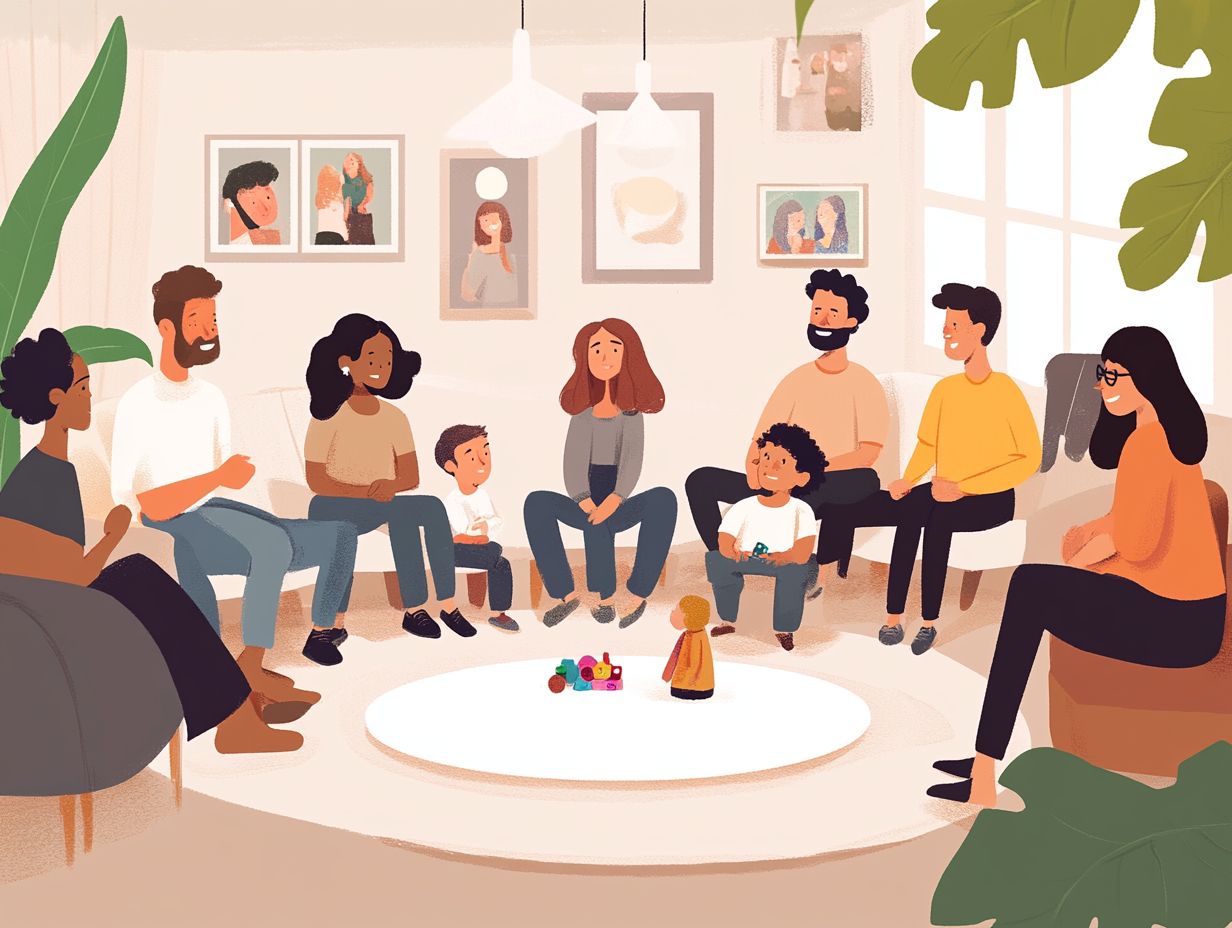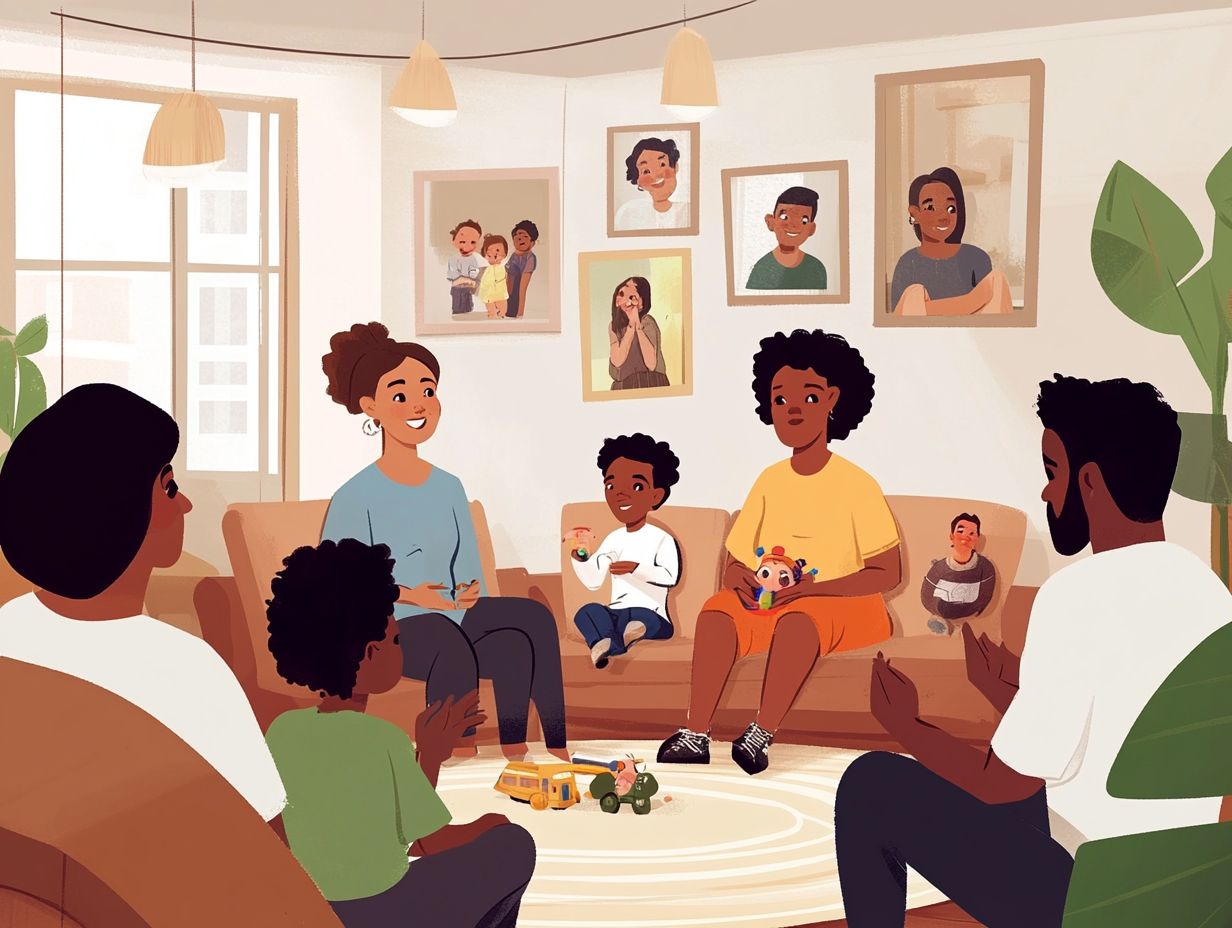How to Communicate During Family Transitions
Family transitions can present challenges. They can also create transformative moments that shape family relationships and communication.
Whether you’re experiencing a shift in family structure, welcoming a new member, or navigating significant life milestones, effective communication becomes essential. This article delves into the various types of family transitions, highlights the importance of communication, and addresses the challenges that may arise along the way.
You ll discover practical tips for enhancing communication, managing conflicts, and recognizing when it s time to seek professional assistance. Embark on this journey to strengthen your family bonds during times of change, and find the resilience to navigate whatever comes your way.
Contents
- Key Takeaways:
- What Are Family Transitions?
- Why Is Communication Important During Family Transitions?
- What Are the Challenges of Communicating During Family Transitions?
- How Can You Improve Communication During Family Transitions?
- How Can You Support Each Other During Family Transitions?
- Seeking Professional Help During Family Transitions
- What Types of Professionals Can Help with Communication During Family Transitions?
- Frequently Asked Questions
- How can effective communication help during family transitions?
- What are some tips for communicating during family transitions?
- How can families handle disagreements during transitions?
- What is the role of communication in maintaining family relationships during transitions?
- How can families communicate with children during transitions?
- What are some common communication pitfalls to avoid during family transitions?
- Frequently Asked Questions
Key Takeaways:

- Effective communication is crucial during family transitions to maintain healthy family bonds and navigate changes successfully.
- Active listening, managing conflict, and creating a supportive environment for communication are key strategies to improve family communication during transitions.
- Seeking professional help, such as family therapy, can provide valuable support and guidance during challenging family transitions. Consider it if communication barriers persist.
What Are Family Transitions?
Family transitions encompass significant changes that impact the structure and dynamics of your family unit. These include events like marriage, divorce, the birth of a child, or relocating. These changes can impact how your family communicates and feels. They also affect the relationships between all family members.
As you navigate these shifts, you ll encounter both challenges and opportunities for growth. Effective communication strategies are necessary to cultivate resilience and understanding. Recognizing and tackling the emotional sides of these transitions is essential. Strong bonds can be built quickly if you act now.
What Are the Different Types of Family Transitions?
Family transitions come in various forms, such as welcoming new members, experiencing separation or divorce, relocating, and enduring the loss of loved ones. Each of these uniquely shapes family dynamics and requires clear communication strategies.
The arrival of a new baby often brings immense joy, yet it can also stir feelings of jealousy or insecurity in older siblings. This underscores the importance of fostering open communication and empathy among family members to navigate these emotions effectively.
Separation or divorce can pose significant challenges to emotional connections. Individuals must grapple with their feelings while striving to maintain healthy relationships, particularly for the benefit of any children involved.
Relocation introduces its own set of stresses as families adjust to unfamiliar environments. This often disrupts established social ties. Supporting one another through this transition is essential, ensuring that everyone feels secure and connected.
The loss of a loved one profoundly impacts family relationships. It requires a nurturing environment filled with understanding and compassion. This support enables each family member to cope with their grief in a healthy and constructive manner.
Why Is Communication Important During Family Transitions?
Effective communication is crucial during family transitions. It acts as the cornerstone for understanding and navigating the emotional intricacies that surface within familial relationships.
By fostering open dialogue, you promote emotional intelligence and resilience. This enables everyone involved to face change with greater ease, adaptability, and trust.
Effective communication is crucial for healthy family dynamics. It influences emotional connections and determines the quality of relationships within the family.
How Does Communication Affect Family Dynamics?
Communication plays a pivotal role in shaping family dynamics. By fostering open dialogue and trust among family members, you create a foundation for healthy interactions.
When you and your family engage in effective and mindful communication, you cultivate a supportive environment. This ensures everyone feels valued and understood.
This approach not only strengthens your emotional bonds but also enhances individual well-being. It allows each member to express their thoughts and feelings without fear of judgment.
Maintaining open lines of dialogue paves the way for constructive conflict resolution. This enables you to address issues before they escalate into larger problems.
By nurturing an atmosphere of respect and empathy, you and your family can tackle challenges together. This ultimately leads to healthier relationships and a deeper sense of belonging.
What Are the Challenges of Communicating During Family Transitions?
Navigating effective communication during family transitions can be quite challenging. You might face emotional barriers, misunderstandings, and the potential for conflict.
These obstacles can impede your ability to foster and maintain healthy family connections.
How Can Conflict Affect Communication During Family Transitions?

Conflict can significantly impact your communication during family transitions. It often leads to breakdowns in dialogue and an increase in misunderstandings.
This dynamic can escalate tensions and weaken emotional connections within your family. These transitions whether it s moving to a new home or welcoming a new sibling tend to stir up heightened emotions and differing perspectives.
It s crucial to explore effective strategies for managing these disputes. Engaging in respectful disagreement helps maintain family harmony.
This approach creates a space where individual feelings are acknowledged and valued. Use skills like active listening and empathy to handle conflicts effectively.
This will strengthen your familial bonds and promote open channels of communication. Everyone will feel heard and understood.
What Are the Barriers to Effective Communication During Family Transitions?
Barriers to effective communication during family transitions can manifest in various ways. These include emotional blockages, misunderstandings, and differing communication styles.
These issues can significantly impede your ability to express feelings and needs openly. Often, these obstacles are rooted in past experiences or traumas that family members carry into new situations.
This creates an atmosphere of distrust or apprehension. Misunderstandings frequently arise from assumptions rather than clear dialogue.
To foster healthier interactions, consider practicing active listening. Engage in open discussions where everyone feels safe to share their thoughts.
Establishing routines, like regular family meetings, can help build empathy and encourage trust. These approaches enhance understanding and promote stronger emotional connections.
They pave the way for a more cohesive family dynamic during challenging times and facilitate engaging interactions.
How Can You Improve Communication During Family Transitions?
Improving communication during family transitions is vital for building resilience. You can achieve this by employing a blend of effective communication strategies.
Dedication to active listening and providing constructive feedback is essential.
What Are Some Tips for Effective Communication During Family Transitions?
Some key tips for effective communication during family transitions include practicing active listening, being receptive to constructive feedback, and ensuring that every family member feels heard and respected in their viewpoints.
By cultivating an environment that prioritizes emotional intelligence, you can navigate the emotional rollercoaster that transitions often bring with greater ease. Recognizing and acknowledging each individual’s feelings and thoughts fosters a sense of belonging and validates their experiences.
Encouraging family members to express themselves freely, without the fear of judgment, promotes autonomy and strengthens mutual respect. Setting aside regular time for family meetings enhances open dialogue, providing a platform for everyone to voice their thoughts or concerns regarding the changes unfolding in their lives.
Creating a culture rooted in empathy and respect significantly bolsters communication during these pivotal moments, ensuring committed interactions and thoughtful communication.
How Can Active Listening Help During Family Transitions?
Active listening is an essential skill that significantly enhances communication during family transitions, fostering emotional understanding, and creating a supportive environment for dialogue and expression through nonverbal communication.
In times of change whether it’s starting a new job, relocating to a different city, or adapting to a new family structure engaging in active listening allows you and your family members to feel truly heard and valued. For example, when children voice their fears about moving, practicing active listening as a parent provides reassurance and validates those feelings, ultimately strengthening your emotional bonds.
This approach not only encourages constructive feedback that leads to collaborative solutions but also deepens trust within your family unit. Ultimately, maintaining these open lines of communication creates richer relationships, where each member feels comfortable sharing their thoughts and emotions, reinforcing the sense that you are all in this together during challenging times. This also enhances trust in family dynamics, fostering understanding and empathy in family communications.
What Are Some Strategies for Managing Conflict During Family Transitions?
Managing conflict during family transitions requires a collaborative approach that emphasizes respect, understanding, and the thoughtful application of conflict resolution skills to navigate disagreements effectively. Key communication techniques and trust-building strategies can greatly aid in this process.
You must create an environment where every family member feels safe to express their thoughts and emotions without the looming threat of backlash. This can be accomplished through open dialogue, where individuals are not only encouraged to voice their perspectives but also to actively listen to others.
By fostering an atmosphere of respectful disagreement, you and your family can delve into various viewpoints and work towards mutually beneficial solutions. Techniques like active listening, summarizing what others say, and utilizing “I” statements can be particularly effective in maintaining healthy communication. Additionally, validating feelings and offering authentic responses can help in understanding emotions better.
Ultimately, by developing a shared understanding and a commitment to resolving conflicts, you can significantly ease the strain during periods of transition. Promoting individual autonomy and family independence while respecting each member’s role further contributes to smoother transitions.
How Can You Support Each Other During Family Transitions?

Supporting one another during family transitions is crucial for maintaining emotional well-being. You can achieve this by offering positive feedback, engaging in empathetic communication, and fostering a nurturing environment where family members feel safe to express their feelings. Additionally, engaging in shared experiences and supportive interactions can greatly enhance the emotional bonds within the family.
What Are Some Ways to Show Empathy and Understanding During Family Transitions?
Demonstrating empathy and understanding during family transitions requires you to actively listen to each other’s feelings and perspectives, validate their experiences, and respond with genuine, supportive interactions. This process can also involve reflecting on past traumas and understanding how they shape current family dynamics.
This approach not only makes family members feel safe but also encourages open dialogue about the challenges and changes at hand, which becomes especially vital in times of upheaval. For instance, imagine a recent move where one parent takes the initiative to sit down with their children and share their own feelings of uncertainty about adjusting to a new neighborhood. This action invites the kids to voice their fears about leaving friends behind.
Such supportive interactions can significantly ease the adjustment process. A shared moment of vulnerability can forge a strong bond, transforming a potentially stressful situation into a meaningful opportunity for connection. By fostering this emotional intelligence, you and your family can navigate transitions more smoothly, creating lasting memories grounded in understanding and compassion.
How Can You Create a Safe and Open Environment for Communication During Family Transitions?
Creating a safe and open environment for communication during family transitions requires you to establish trust, encourage engaging interactions, and ensure that everyone feels comfortable expressing their thoughts and feelings without the fear of judgment.
To achieve this, you can implement trust-building activities that foster a sense of security and connection among family members. Some examples include:
- Family game nights in San Antonio
- Regular family meetings
Holding regular family meetings provides a structured way for everyone to share their experiences and concerns while underscoring the importance of active listening. These activities also highlight the importance of validating feelings and promoting authentic responses during discussions.
Engaging interactions like family game nights or shared educational activities offer perfect opportunities for bonding and promote open dialogue. Using I statements helps each family member express their feelings more clearly, minimizing potential conflict.
By prioritizing these practices, you can cultivate an atmosphere where healthy communication thrives, ultimately supporting each member s emotional well-being during transitions.
Seeking Professional Help During Family Transitions
Seeking professional assistance during family transitions can offer invaluable support for you and your loved ones as you navigate challenges related to communication, emotional understanding, and conflict resolution. Engaging in a therapeutic process can provide clarity and help in establishing healthier family roles and interactions.
This proactive approach ultimately enhances your emotional well-being and strengthens the dynamics of your relationships.
When Should You Consider Seeking Professional Help During Family Transitions?
During transitions, families should seriously consider seeking professional help when emotional challenges begin to feel overwhelming, communication issues linger, or conflicts escalate beyond effective management. Spotting these signs early helps you solve problems and build emotional strength.
Timely intervention can pave the way for healthier interactions. When you notice patterns of distress like frequent misunderstandings or escalating arguments over trivial matters it often signals that deeper issues may be at play. Addressing these issues promptly can prevent them from negatively impacting your family’s independence and overall harmony.
Engaging with a professional can provide you with invaluable insights and tools to navigate these complexities, fostering a supportive environment. Addressing these challenges early on can prevent them from becoming ingrained, enabling your family to strengthen bonds and enhance communication skills, ultimately cultivating a more harmonious home life. It also promotes interpersonal communication and the understanding of each family member’s emotions.
What Types of Professionals Can Help with Communication During Family Transitions?
Various professionals can assist you and your family with communication during transitions, including therapists, counselors, and family mediators. Each brings a unique approach to support emotional connections and foster effective dialogue. These professionals play a crucial role in the therapeutic process, helping families navigate difficult emotional landscapes.
For instance, therapists specialize in tackling emotional and psychological challenges. They guide families through the difficult feelings that often surface during times of change. Counselors can provide valuable guidance and coping strategies, creating a safe space for open discussions. Family mediators are people who help resolve conflicts and facilitate communication among family members, especially in tough situations, ensuring that every voice is heard.
Involving these experts in family therapy enhances understanding and empathy within your family. It also equips you with vital communication strategies, enabling you to express needs and concerns more effectively. Ultimately, this promotes healthier dynamics and stronger relationships during transitions. This approach can also help address past traumas and foster a greater understanding of family roles and dynamics.
Frequently Asked Questions

How can effective communication help during family transitions?
Effective communication can help family members to understand and support each other during times of change. It allows for open and honest dialogue, which can alleviate stress, resolve conflicts, and foster a sense of unity and collaboration within the family.
What are some tips for communicating during family transitions?
Some tips for effective communication during family transitions include actively listening to each other, expressing emotions in a healthy way, being respectful and non-judgmental, and setting aside time for regular family meetings to discuss any changes or challenges.
How can families handle disagreements during transitions?
During times of change, there may be disagreements and conflicts within the family. It is important to communicate calmly, listen to each other’s perspectives, and find a compromise or solution that works for everyone. Seeking outside support from a therapist or mediator can also help families navigate difficult conversations and find resolutions.
What is the role of communication in maintaining family relationships during transitions?
Communication is the lifeline that keeps family bonds strong during transitions! It allows family members to stay connected, understand each other’s needs, and work together to navigate through any changes or challenges. Without communication, family relationships may suffer and become strained.
How can families communicate with children during transitions?
When communicating with children during family transitions, it is important to be honest and age-appropriate. Encourage children to express their feelings and concerns, and provide reassurance and support. Maintain a sense of routine and stability, and involve children in the decision-making process when appropriate.
What are some common communication pitfalls to avoid during family transitions?
Some common communication pitfalls to avoid during family transitions include blaming or criticizing others, shutting down or avoiding difficult conversations, and making assumptions about others’ thoughts or feelings. It is important to approach communication with empathy and understanding, actively listen, and validate each other’s experiences.
Don’t underestimate the power of communication during challenging times! If you are navigating family transitions, consider seeking help from professionals to support you and your family. Check local resources for therapists or mediators who can guide you through this process.






